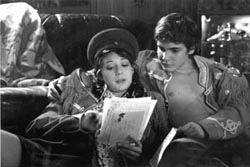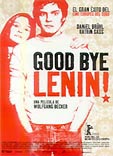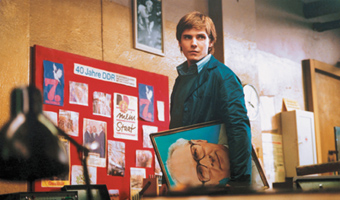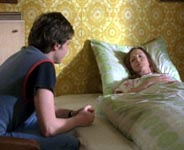| |
October 1989 was a bad time to fall into a coma if you
lived in East Germany. But that is what happened to Alex's proudly socialist
mother, Christiane. When she awakens eight months later, her heart is
weak and any shock could kill her. And what could be more shocking for
her than the fall of the Wall and the triumph of capitalism in the East.
This is the starting point for a wildly inventive, very funny and often
very poignant comedy, as we watch Alex go to ever-increasing lengths to
protect his mother from the truth. Their apartment is transformed into
a kind of socialist museum and Alex enthusiastically recruits the neighbours
into maintaining the pretense that Lenin really did win after all!
GOODBYE LENIN! is the work of writer-director Wolfgang Becker, a founding
member of the X Film Creative Pool - the team that has produced some of
Germany's best cinema in recent years including RUN LOLA RUN and other
Tom Tykwer films. Becker is no tyro. He was born in 1954 and began making
films as a university student. He went on to make several features as
well as television dramas, culminating in his masterpiece, GOODBYE LENIN!
In Becker's words: "I was fascinated by the idea of a son trying
to save his mother's life, trying to keep death at bay with a lie, and
getting more and more entangled in his lie. ... The best way to describe
Alex is as a sailor in a leaky boat and he's busily trying to stop up
one leak after another. ... I was also excited by the idea of combining
this with an important chapter in German history as well, or at least
having it as a background. ... For his own personal reasons, Alex moves
in a different direction from everyone else, namely backwards, trying
to re-build what everyone else is merrily leaving behind them. It's a
wonderful summer of change."
Daniel Bruhl in the role of Alex is one of Germany's fastest-rising young
stars and has starred in many films since his debut in 1998. The film
also boasts a wonderful music score by Yann Tiersen who wrote the music
for AMELIE a couple of years ago.
GOODBYE LENIN! quickly became one of the most popular German films ever
made, not only in Germany itself (where it rode on a wave of "ostalgie"
- nostalgia for the East) but also throughout Europe. In England it doubled
the audiences for RUN LOLA RUN. It has been applauded and has won awards
at major film festivals around the world, including the recent Canberra
International Film Festival.
http://www.electricshadows.com.au/film/2385556136
|
October 1989 was a bad time to fall into a coma if you
lived in East Germany - and this is precisely what happens to Alex's mother,
an activist for social progress and the improvement of everyday life in
socialist East Germany. Alex has a big problem on his hands when she suddenly
awakens eight months later. Her heart is so weak that any shock might
kill her. And what could be more shocking than the fall of the Berlin
Wall and the triumph of capitalism in her beloved country? To save his
mother, Alex transforms the family apartment into an island of the past,
a kind of socialist museum where his mother is lovingly duped into believing
that nothing has changed. What begins as a little white lie gets more
and more out of hand as Alex's mother, who feels better every day, wants
to watch TV and even leaves her bed one day…
In a wonderful, touching and comic manner, Good Bye, Lenin! tells the
story of how a loving son tries to move mountains and create miracles
to restore his mother to health - and keep her in the belief that Lenin
really did win after all!
Wolfgang Becker was born in 1954 in Hemer/Westphalia and studied German,
History and American Studies at the Free University in Berlin. He followed
this with a job at a sound studio in 1980 and then began studies at the
German Film & Television Academy (dffb). He started working as a freelance
cameraman in 1983 and graduated from the dffb in 1986 with Butterflies
(Schmetterlinge), which won the Student Academy Award in 1988, the Golden
Leopard at Locarno and the Saarland Prime-Minister's Award at the 1988
Ophuels Festival Saarbruecken. He directed the Tatort-episode, Blutwurstwalzer,
before making his second feature Children's Games (Kinderspiele, 1992),
the documentary Celibidache (1992), and the Berlinale competition features
Life is All You Get (Das Leben ist eine Baustelle, 1997), and Good Bye,
Lenin! (2003).
http://www.german-cinema.de/archive/film_view.php?film_id=939
|
| A son's bid to hide the fall of the Berlin Wall stretches
a joke, writes Alexa Moses.
Comedy comes in as many different flavours as gelato. Gelato can be purchased
in mango, chocolate, or choc-chip and cassata; comedy can, for example,
be romantic, action, absurd, farcical, satirical, physical or black. And
like gelato, comedy follows some general rules: while gelato is frozen
and usually sweet, comedy always aims to be funny.
Good Bye, Lenin! has been marketed as the first funny German comedy,
and as far as gelato flavours go, the movie might be slushy green tea.
Which is a complicated way of saying that although this clever, moving
little film has been packaged as a comedy, it's so gently comic as to
almost rule itself out of the genre.
Television repairman Alex Kerner (Daniel Bruhl) is the son of a single,
staunchly socialist mother, Christiane Kerner (Katrin Sa) in East Germany
in 1989. When Christiane has a heart attack and lapses into a coma for
eight months, she misses the fall of the Berlin Wall and the reunification
of Germany. Which means her socialist world no longer exists. Capitalism
floods the old East Germany, radically altering the lives of Alex and
his sister Ariane (Maria Simon) in a matter of months.
The catch is that, when Alex's mother wakes up, she needs to avoid all
shocks in case of another heart attack. Ever dutiful, Alex decides to
delay telling his mother that the wall has fallen and, with his sister's
grudging help, creates a time warp of the sham socialist Germany inside
their house. Cue the laughs, as Alex makes the house a museum of 1980s
German socialism. Putting back all the old furniture he had dumped is
just one of his tactics. Of course, the longer Alex keeps up the charade,
the harder it becomes to tell his mother the truth.
Yet watching the earnest Alex devote himself to saving his mother isn't
erxactly chuckleworthy. It's also tragic, in the best sense of the word.
Wolfgang Becker and Bernd Lichtenberg's sadly comic script plumbs a segment
of history that hasn't been explored in film fiction before. The core
of the story is the disintegrating family, surrounded by the disintegrating
city. Despite the general charm of the film, the story doesn't sustain
the two hours, and the film is drab and lags in parts.
Director Becker uses archival footage cannily and coaxes understated
performances from his actors. As the shy, stubborn Alex, Bruhl manages
to express, simultaneously, Alex's emotions, Alex's awkwardness at his
emotions, and Alex's attempts to hide his emotions. Sa is moving as Alex's
staunchly socialist mother, and Simon engages as the exuberant, brash,
vulnerable Ariane.
It adds up to an overlong, although clever and charming film, well-acted
and intelligently directed. But don't expect it to be long on laughs.
SMH, December 23, 2003
http://www.smh.com.au/articles/2003/12/23/1071941708337.html

|
| Synopsis: It’s 1989, Alex (Daniel Bruhl) lives with
his mother Christiane (Katrin Sass) and his sister in an apartment in
Berlin. Germany is still a divided country. Alex’s mother has sought
to lessen the pain of losing her husband to the West by immersing herself
in service to The Cause. An unfortunate turn of events finds her in a
coma. In the mean time, the Berlin Wall comes down. The doctors warn Alex
against exposing her to any circumstances that might cause any upset.
When she awakens to a new Germany, Alex believes he has no other choice
than to pretend nothing has changed.
Everybody loves this film except me. The flyer tells us it is ‘The
Most Successful European Film Of The Year’, so maybe you should
not read on. Better to go and see it for yourself, then maybe come back
and see why I have not added Goodbye Lenin! to my list of best films for
2003. I was looking forward to the film. I liked the idea of a comedy
with the historical setting being the fall of the Berlin Wall, especially
from the viewpoint of a German filmmaker looking back more than a decade
after the event.
There are many things about Goodbye Lenin! that are watchable. The team
responsible for production design have created a meticulous representation
of Germany under communism. I imagine the film would have been like entering
a time warp for those who lived through such times. The choices made by
casting personnel resulted in characters that were totally believable
in their respective roles. It crossed my mind that if Daniel Bruhl wanted
to try his luck in Hollywood, he would be a great choice to play the role
of Jack Black’s handsome younger brother.
All of this professional filmmaking skill aside, I had a major problem
with the basic premise. The idea that Alex would go to so much trouble
to recreate the old regime in order to avoid exacerbating his mother’s
illness just did not wash with me. I couldn’t help but roll my eyes
when I realised where the story was heading.
Other members of the audience laughed while I sat there gnashing my teeth.
Stupid idea, who came up with this one? Such thoughts were whizzing through
my mind at a pace I could not halt. I’ve tried to put my finger
on why I had such a strong negative response. All I can come up with is
that if I were the mother in this film, I would not find Alex’s
efforts charming or selfless. I have wondered if maybe Alex’s obsessive
course of action had been more over the top in a farcical way whether
I would have been more willing to be carried along by the story.
So there you have it. Let me take this opportunity to apologise to all
involved in the making of the film, and remind them that I am in the minority
and I think it’s great that so many people love this film. I just
wish I knew why.
Reviewed by Ruth Williams
http://www.cinephilia.net.au/show_review.php?reviewid=331&movieid=2071
|
| 
|
Alex, Daniel Bruehl, is an East German who grows up rejoicing in the
victories of his country. His mother Christiane, Katrin Sass, was devastated
and psychotically traumatised after her husband defected to the West.
On recovery she devotes herself to socialism and the State. In 1989 she
has a heart attack and ends up in a coma. When she emerges eight months
later the world has changed, the Berlin Wall has fallen, free elections
have taken place, the West has invaded, Alex's sister Ariane, Maria Simon,
works at Burger King. But any shock could be dangerous for Christiane,
so Alex, with the help of his sister and work colleague Rainer, Alexander
Beyer, creates a world of the past for his mother, as if nothing had happened.
This Award-winning and audience-pleasing film - it stunned the box office
in Germany - has impressive performances and a lovely premise. The love
that Alex has for his mother and the efforts he goes to to protect her
are the emotional core of the film. Director Wolfgang Becker has imbued
the film with humour, ingenuity and an acute political eye. But he's elongated
the film beyond a sensible length and the voice-over - Alex's - tends
to pre-empt events, undermining the film's exposition. Despite the carping
Goodbye Lenin! is filled with a complicated yet winning nostaligia, for
a mother and a country that don't exist any more.
Reviewed by Margaret Pomeranz
http://www.sbs.com.au/movieshow/reviews.php3?id=1256
|
If, like me, the phrase “German comedy” gives
you a strange feeling of dread, fear not: “Good Bye, Lenin!”
manages to (more or less) successfully weave humor and emotion to produces
a work of surprising warmth.
Alex (Daniel Brühl) has a problem; his mother (Katrin Sass) has
been in a coma for eight months. Worse, while the die-hard socialist matriarch
is down for the count, the Berlin Wall comes down and East Germany is
no more. After she emerges from her catatonic state, Alex is informed
that any sudden shock could be fatal. A shock lie, say, the news that
the regime you’ve enthusiastically supported your entire life is
suddenly no more. He therefore decides to fool his mother into thinking
the GDR is still around, and sets out to transform the apartment they
share into a shrine, of sorts, to socialism. He also enlists family and
friends in the effort, eventually reaching a point where his mother believes
Lenin and Communism have won.
Director Wolfgang Becker takes the farce almost the point of no return,
though in the early stages: outfitting the apartment with crappy GDR era
furniture, working in the classic sputtery Trabant, and even having Alex
re-edit footage of the Wall coming down for his mother to make it look
like West Germans were flooding into the East, instead of the other way
around. This theater of the absurd makes the inevitable emotional conclusion
a little hard to accept.
The poignancy, ultimately, comes from Alex’s growing awareness
that not only is he trying to preserve his mother’s health, but
also to recreate the strong, self-assured woman she once was. “Good
Bye, Lenin!” relies heavily on strong performances from Brühl
and Sass to make the illusion believable.
Reviewed by Pete Vonder Haar, (2004-01-19)
http://www.filmthreat.com/Reviews.asp?Id=5382
|






